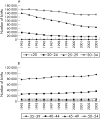Advanced paternal age: how old is too old?
- PMID: 16973530
- PMCID: PMC2566050
- DOI: 10.1136/jech.2005.045179
Advanced paternal age: how old is too old?
Abstract
Average paternal age in the UK is increasing. The public health implications of this trend have not been widely anticipated or debated. This commentary aims to contribute to such a debate. Accumulated chromosomal aberrations and mutations occurring during the maturation of male germ cells are thought to be responsible for the increased risk of certain conditions with older fathers. Growing evidence shows that the offspring of older fathers have reduced fertility and an increased risk of birth defects, some cancers, and schizophrenia. Adverse health outcomes should be weighed up against advantages for children born to older parents, mindful that these societal advantages are likely to change over time.
Conflict of interest statement
Competing interests: none.
References
-
- Chamberlain J, Corbin T. Trends in reproductive epidemiology and women's health. In: Moody J, ed. Why mothers die 2000–2002—report on confidential enquiries into maternal deaths in the United Kingdom. London: RCOG Press at the Royal College of Obstetricians and Gynaecologists, 2004
-
- Heffner L J. Advanced maternal age—how old is too old? N Engl J Med 20053511927–1929. - PubMed
-
- National Collaborating Centre for Women's and Children's Health Fertility: assessment and treatment for people with fertility problems. London: NICE, 2004
MeSH terms
LinkOut - more resources
Full Text Sources


